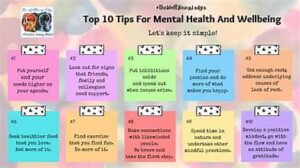In 2024, managing stress and anxiety is more crucial than ever due to the fast-paced nature of modern life. With the constant influx of information, societal pressures, and an ever-changing world, it’s easy to feel overwhelmed. However, prioritizing mental health is essential for maintaining a balanced and fulfilling life. Here are the top 10 mental health tips for 2024 to help you manage stress and anxiety effectively.
1. Practice Mindfulness and Meditation
Mindfulness and meditation are powerful tools for managing stress and anxiety. They help you stay present, reduce negative thinking, and improve overall emotional regulation. Start by dedicating just 10 minutes a day to mindfulness exercises, such as deep breathing or body scans. Apps like Headspace and Calm offer guided sessions that can help you get started. Regular practice can lead to improved focus, reduced stress, and a greater sense of calm.
2. Exercise Regularly
Physical activity is not only good for your body but also your mind. Exercise releases endorphins, which are natural mood lifters. Aim for at least 30 minutes of moderate exercise, such as walking, jogging, or yoga, most days of the week. Not only does exercise help in reducing anxiety and stress, but it also improves sleep, boosts self-esteem, and promotes better overall mental health.
3. Maintain a Balanced Diet
Your diet plays a significant role in your mental health. A balanced diet rich in fruits, vegetables, lean proteins, and whole grains can improve brain function and mood. Omega-3 fatty acids, found in fish like salmon and flaxseeds, are known to support brain health and reduce symptoms of anxiety and depression. Additionally, staying hydrated is crucial, as even mild dehydration can impact your mood and energy levels.
4. Establish a Routine
Having a structured routine can help manage stress by providing a sense of predictability and control. Set regular times for waking up, eating, working, and sleeping. A consistent routine helps regulate your body’s internal clock, making it easier to fall asleep and wake up refreshed. It also reduces the mental load of decision-making, which can alleviate anxiety.
5. Limit Screen Time
Excessive screen time, especially on social media, can contribute to stress and anxiety. Constant exposure to news, negative content, or unrealistic comparisons can impact your mental health. Set boundaries for your screen time, particularly before bed, as the blue light emitted by screens can interfere with sleep. Consider implementing digital detoxes regularly to reset your mind and reduce stress.
6. Seek Professional Help
There’s no shame in seeking professional help when needed. Therapists, counselors, and psychologists are trained to help you navigate stress and anxiety. Cognitive Behavioral Therapy (CBT), for instance, is an effective treatment for anxiety and depression, helping individuals change negative thought patterns. If therapy isn’t accessible, online platforms like BetterHelp and Talkspace offer affordable options for connecting with mental health professionals.
7. Practice Self-Compassion
Many people struggling with anxiety and stress are also overly critical of themselves. Practicing self-compassion involves treating yourself with the same kindness and understanding as you would a friend. Acknowledge that it’s okay to have bad days and that nobody is perfect. Self-compassion can help reduce feelings of inadequacy and promote emotional resilience.
8. Connect with Others
Human connection is vital for mental well-being. Maintaining healthy relationships with family, friends, and colleagues can provide support and reduce feelings of isolation. Make time for social activities and reach out to loved ones regularly, even if it’s just a phone call or text. Volunteering and participating in community activities can also provide a sense of purpose and belonging.
9. Get Enough Sleep
Sleep is essential for mental health. Poor sleep can exacerbate stress and anxiety, while quality sleep can enhance mood and cognitive function. Aim for 7-9 hours of sleep per night and establish a bedtime routine that promotes relaxation, such as reading or taking a warm bath. Avoid caffeine and heavy meals before bedtime and ensure your sleeping environment is conducive to rest.
10. Practice Gratitude
Focusing on what you’re grateful for can shift your mindset from negative to positive. Start a gratitude journal where you write down three things you’re grateful for each day. This practice can help reduce stress and anxiety by focusing on the positive aspects of your life. Over time, cultivating an attitude of gratitude can improve your overall mental well-being.
Conclusion
Managing stress and anxiety is a continuous process that requires effort and commitment. By incorporating these mental health tips into your daily routine, you can build resilience, improve your emotional well-being, and better navigate the challenges of the modern world. Remember, taking care of your mental health is not a luxury; it’s a necessity for a fulfilling and balanced life in 2024. Prioritize self-care, seek support when needed, and embrace practices that promote peace and happiness.


